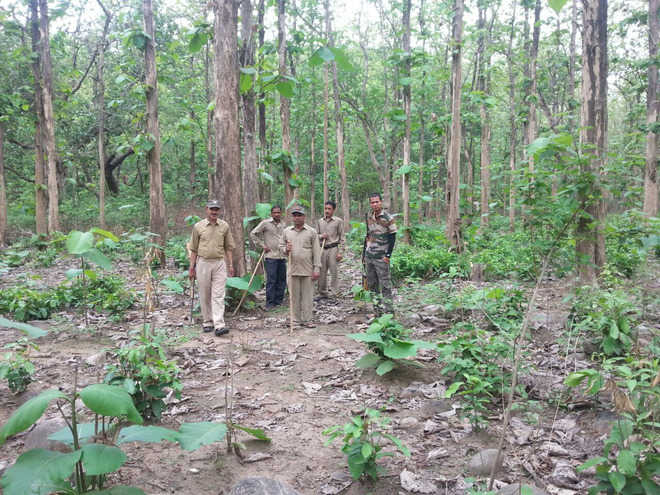Jotirmay Thapliyal
Tribune News Service
Dehradun, July 8
The tiger population in the Jim Corbett National Park is thriving due to the hard work and dedication of the patrolling staff who brave all vagaries of nature to ensure that the striped cat is safe and secure.
The duty-oriented forest personnel at times also face the wrath of tigers but that does not deter them from patrolling the core area of the Tiger Reserve in the state that boasts of a highest density of tigers in the world.
The story of Jai Kishen, one such forest staff member at the Corbett Tiger Reserve, amply reflects the challenges before the foresters who patrol through difficult terrain under tough weather conditions to ensure it is a safe habitat for tigers.
On July 19, 2015, when the monsoon was at its peak, Jai Kishen, while on routine patrolling during early morning hours, was attacked by a tiger in the Gairal area of the Sarpduli range of the reserve. He received severe injuries in his lower abdomen, legs and back.
On the initiative of Dr Saket Badola, Deputy Director of Corbett Tiger Reserve, injured Jai Kishen was rushed to the government hospital in Ramnagar and subsequently referred to the Chamunda Nursing Home, Kashipur, considering serious injuries. He remained under supervision of doctor for 19 days.
This was not the end of it as in the months to follow he complained of pain in the lower abdomen while performing duty and was subsequently treated at Dr Susheela Tiwari Government Hospital, Haldwani.
As the cost of treatment escalated, the WWF-India that had earlier provided him Rs 25000 to treatment bills again came to his rescue. Ravi Singh, Secretary General and Chief Executive Office of the WWF-India, who came to know that Jai Kishen was still experiencing pain even after 10 months of the tiger attack, took him to Delhi. Jai Kishen was brought to New Delhi and was operated upon for bilateral hernia in Indraprastha Apollo Hospital on May 11, 2016.
The WWF-India that has entered into a partnership with the Apollo Hospital Charitable Trust under the Specialised Medical Care Scheme meant to provide medical relief to the forest staff came in handy in the Jai Kishen case.
After successful treatment at Apollo Hospital, Jai Kishen is now back at work. “I love my work of a wildlife protector in the Corbett Tiger Reserve. I am proud of what I do,” he says. He continues to work as a forest staff and patrols the vast stretches of the Corbett Tiger Reserve.
Unlock Exclusive Insights with The Tribune Premium
Take your experience further with Premium access.
Thought-provoking Opinions, Expert Analysis, In-depth Insights and other Member Only Benefits
Already a Member? Sign In Now










